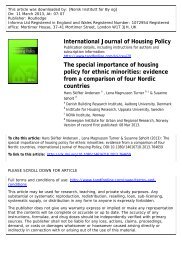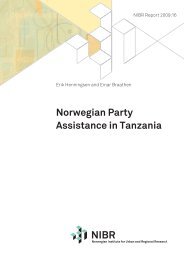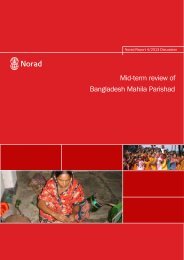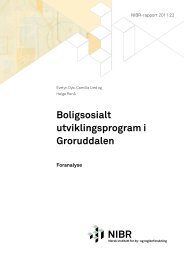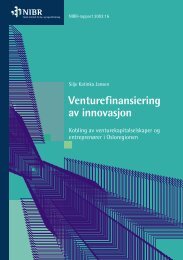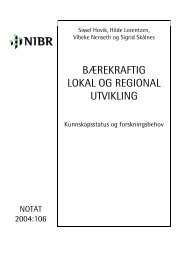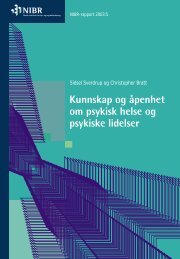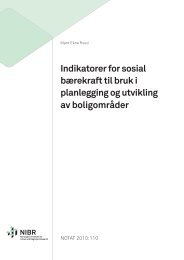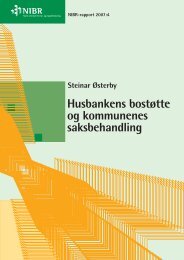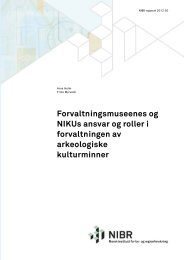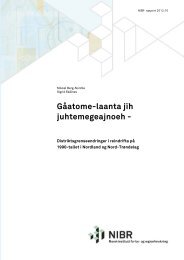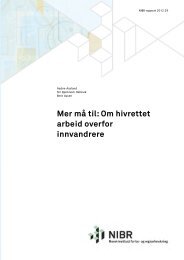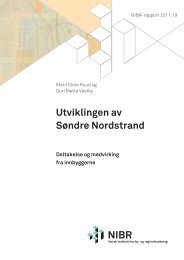Evaluation of the Southern and Eastern Africa Regional Centre for ...
Evaluation of the Southern and Eastern Africa Regional Centre for ...
Evaluation of the Southern and Eastern Africa Regional Centre for ...
- No tags were found...
You also want an ePaper? Increase the reach of your titles
YUMPU automatically turns print PDFs into web optimized ePapers that Google loves.
however, not consistent with some years not being recorded. O<strong>the</strong>rwise, in general,<strong>the</strong> impression is none<strong>the</strong>less <strong>of</strong> a less proactive role in directing <strong>the</strong> <strong>Centre</strong>.The board meetings are held every second year <strong>and</strong> some respondents had difficultiesrecalling <strong>and</strong> identifying issues emerging from <strong>the</strong> board meetings. In more recentyears, especially <strong>the</strong> most recent meeting, more substantive issues do appear to bediscussed <strong>and</strong> decisions taken. Some examples include that <strong>the</strong> human rights modulewas made compulsory. O<strong>the</strong>r issues concerned deliberations over one particularlecturer whose contract was terminated. Ano<strong>the</strong>r was <strong>the</strong> issue <strong>of</strong> succession, whichagain, was thoroughly discussed <strong>and</strong> resulted in <strong>the</strong> Board reluctance to accept <strong>the</strong>Director’s decision to resign but finally endorsing <strong>the</strong> current Deputy <strong>of</strong> <strong>the</strong> <strong>Centre</strong>to take over <strong>the</strong> leadership. The Board being a core group who have known eacho<strong>the</strong>r <strong>for</strong> several years, now appear able to take some difficult decisions <strong>and</strong> havegrown more into <strong>the</strong> role a board should play. In general, <strong>the</strong>re<strong>for</strong>e <strong>the</strong> regionalboard has per<strong>for</strong>med a pr<strong>of</strong>essional peer-review type role that has contributed toquality control <strong>of</strong> <strong>the</strong> course. It may though be beneficial <strong>for</strong> someone from outside<strong>the</strong> university system but with experience <strong>of</strong> regional research, dissemination <strong>and</strong>advocacy, working at a regional level to be invited on to <strong>the</strong> board.The board is structured through MOUs that have shaped institutional collaborationbetween <strong>the</strong> <strong>Centre</strong>/UZ <strong>and</strong> participating entities. The MOUs have taken a long timeto be realised <strong>and</strong> <strong>the</strong> time <strong>and</strong> ef<strong>for</strong>t should not be underestimated. Indeed, afterseveral years MOUs are still to be <strong>for</strong>mally made in <strong>the</strong> case <strong>of</strong> University <strong>of</strong> Nairobi.The MOUs are deemed necessary in terms <strong>of</strong> ensuring accountability especially whenit comes to transfer <strong>of</strong> funds (<strong>for</strong> example, to libraries, <strong>and</strong> <strong>for</strong> research).4.2.2 Academic sustainability<strong>Regional</strong> collaboration is evident in <strong>the</strong> teaching whereby teachers from <strong>the</strong> <strong>Centre</strong>’spartner institutions, who are also regional experts on <strong>the</strong>mes relating to women <strong>and</strong><strong>the</strong> law, are invited to lecture at <strong>the</strong> <strong>Centre</strong>. This approach ensures that a regionalperspective is included in <strong>the</strong> teaching <strong>and</strong> exposes <strong>the</strong> students to a number <strong>of</strong>experts in <strong>the</strong> field. In return <strong>the</strong>re is <strong>the</strong> remuneration associated with teaching,while some felt it was prestigious to be associated with <strong>the</strong> course. There was somelimited funding available <strong>for</strong> library materials but this was nei<strong>the</strong>r consistent norreceived by all. There was also some limited funding <strong>for</strong> research (see below). Whathas been a significant achievement is in establishing a pool <strong>of</strong> qualified people toteach women’s law in <strong>the</strong> region. For instance, in Kenya a relatively large number <strong>of</strong>graduates have taken <strong>the</strong>ir training into establishing gender related courses in <strong>the</strong>irrespective universities. The University <strong>of</strong> Nairobi, according to <strong>the</strong> regional boardchair, would not have people to teach women <strong>and</strong> law if <strong>the</strong>y had not graduated from<strong>the</strong> centre (citing she herself). <strong>Regional</strong> universities had also benefited, <strong>for</strong> example,<strong>the</strong> development <strong>of</strong> new course in a regional university in Zambia, <strong>and</strong> also a similarinitiative at <strong>the</strong> University <strong>of</strong> Mount Kenya <strong>and</strong> o<strong>the</strong>rs.The recent publication Women & Law is a good example <strong>of</strong> regional collaborationwith respect to research <strong>and</strong> publications. It is edited by <strong>the</strong> Director <strong>and</strong> DeputyDirector <strong>of</strong> <strong>the</strong> <strong>Centre</strong>, <strong>and</strong> includes chapters from regional partners <strong>and</strong> makes animportant contribution to <strong>the</strong> discipline by sharing innovative teaching experiences<strong>and</strong> methodologies <strong>of</strong> <strong>the</strong> <strong>Centre</strong>. Prior to this 2011 publication, a book <strong>for</strong>ming part45



